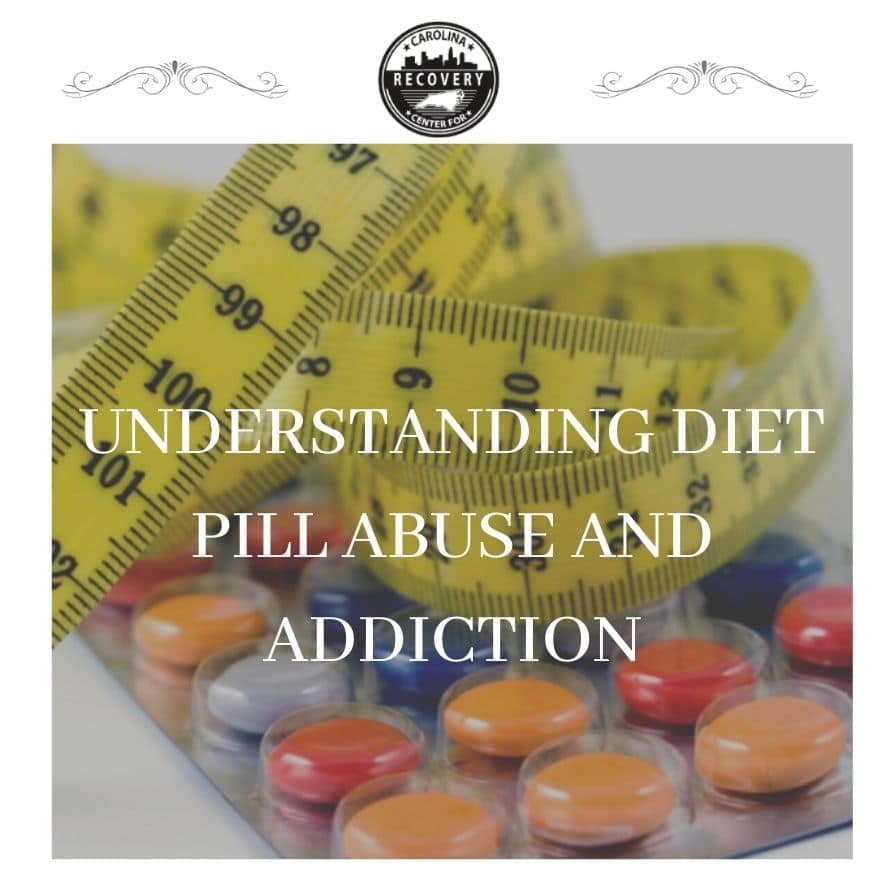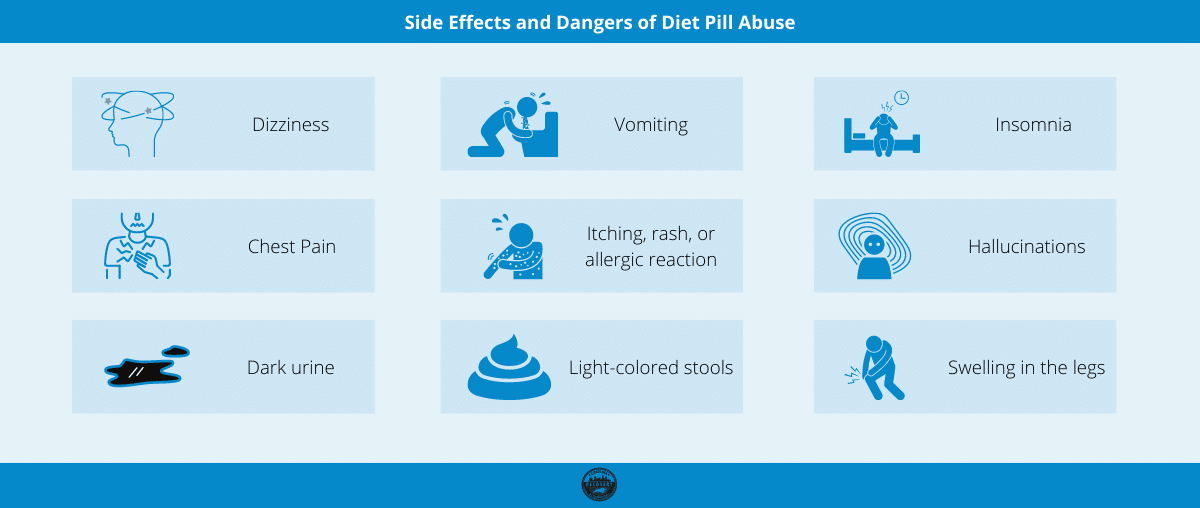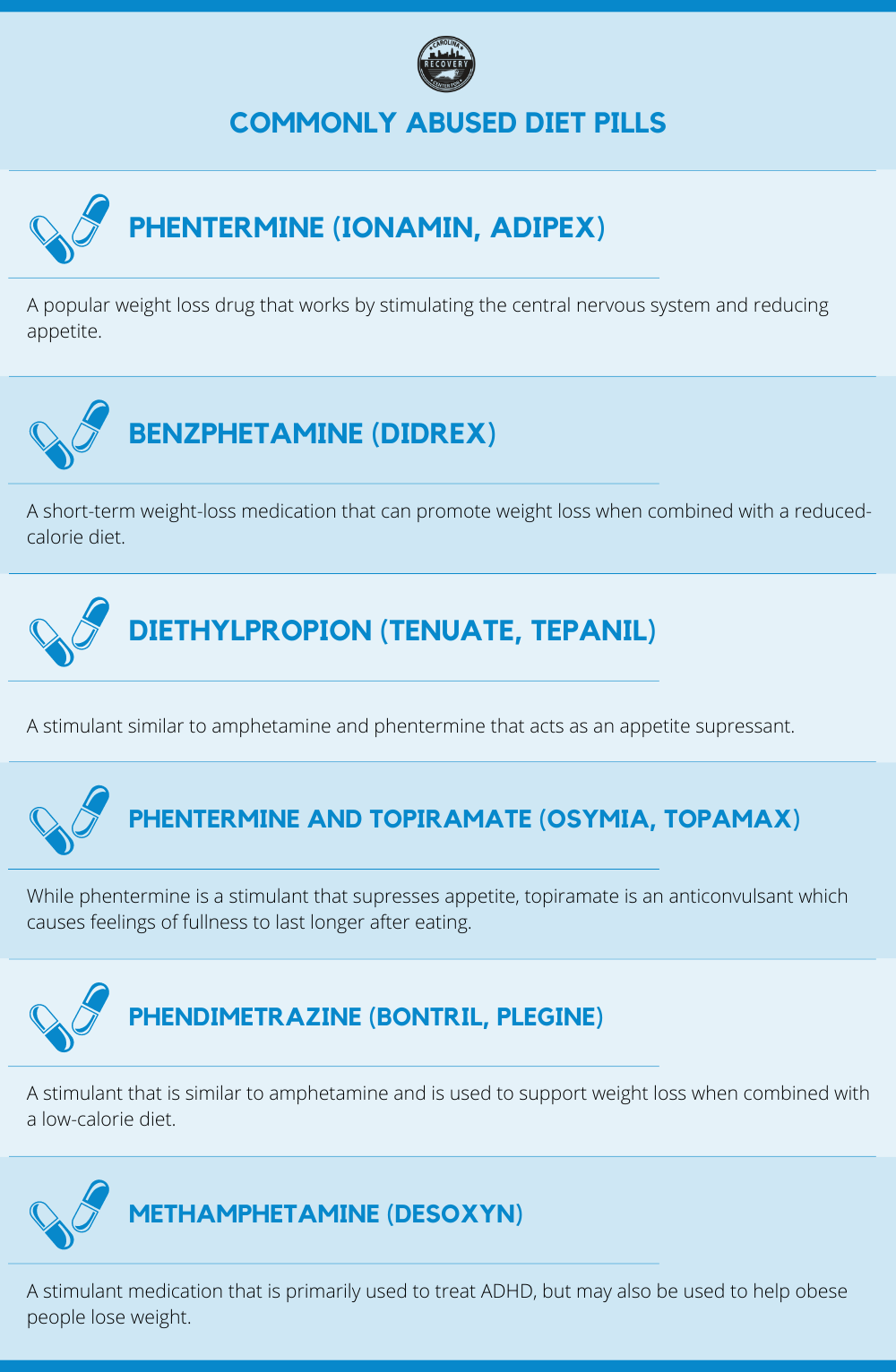Understanding Diet Pill Abuse and Addiction

Medically Verified: 2/1/24
Medical Reviewer
Chief Editor

All of the information on this page has been reviewed and verified by a certified addiction professional.
While diet pills may seem harmless, both prescription and over-the-counter formulations can have dangerous side effects as well as a moderate risk potential for abuse and addiction. There are many different types of diet pills out there that attempt to help people reduce or control their weight by boosting metabolism, reducing appetite, or preventing the absorption of fat. Most prescription diet pills are labeled as Schedule III or IV controlled substances due to their potential for abuse. Other over-the-counter supplements are highly unregulated.
When prescribed by a doctor and used correctly and combined with diet and exercise, weight-loss medications can be safe and effective. When they fall into the wrong hands, however, they can be dangerous. Diet pills are most commonly abused by people seeking stimulant effects or those with disordered eating patterns. Long term abuse of these medications can lead to diet pill addiction.
Side Effects and Dangers of Diet Pill Abuse
Modern diet pills are made to serve as a safer replacement for amphetamine appetite suppressants. However, diet pills and amphetamines have many similar properties that make both substances addictive. Amphetamines are stimulants that increase energy and performance while reducing appetite, and diet pills produce many of the same side effects.
People who abuse diet pills may experience increased energy, feelings of euphoria, physical dependence, and, eventually, addiction. Additional side effects include:[1]

- Dizziness
- Vomiting
- Insomnia
- Chest pain
- Itching, rash, or allergic reaction
- Hallucinations
- Dark urine
- Light-colored stools
- Swelling in the legs
Stimulant diet pills are the most addictive type of diet pill. Persistent use of these can lead to the above side effects in addition to increased heart rate, flushed skin, and dry mouth. In the long term, diet pill abuse can lead to pulmonary hypertension, heart disease, severe constipation, and physical dependence or addiction.
Types of Commonly Abused Diet Pills
Diet pills refer to a class of drugs that have similar goals but different mechanisms of action. As such, diet pills can be classified into three distinct categories based on their effects on the body.
- Stimulants – stimulants typically contain amphetamines that increase energy and provide a sense of euphoria. This is the most addictive type of diet dill.
- Fat Inhibitors – fat inhibitors activate in the stomach and intestines to help reduce the rate of fat absorption.
- Appetite suppressants – appetite suppressants can also be addictive because they target norepinephrine and serotonin in the brain, two neurotransmitters that affect mood as well as appetite.
Some weight-loss medications, such as Contrave, are FDA-approved and have a low risk of abuse. Others are highly regulated as Schedule III or IV substances because they do have a potential for abuse. On the other hand, some more dangerous diet pills, such as Fenfluramine and Meridia, have been banned in the United States by the Food and Drug Administration after causing severe addictions and overdose deaths.[2]
Some of the most commonly abused diet pills are stimulants, and these include:
- Phentermine (Ionamin, Adipex)
- Benzphetamine (Didrex)
- Diethylpropion (Tenuate, Tepanil)
- Phentermine and topiramate (Osymia, Topamax)
- Phendimetrazine (Bontril, Plegine)
- Methamphetamine (Desoxyn)

More recently, herbal diet pills or supplements have also appeared on the market. Herbal diet pills are typically over-the-counter substances that are not approved by the FDA nor are they considered safe for weight loss.
Since little is known about these substances and they haven’t gone through clinical trials, it is difficult to say whether or not they are addictive. That being said, weight loss supplements are removed from shelves on a weekly basis by the FDA because many contain toxic chemicals or dangerously high levels of NSAIDs – substances that, in high doses, can cause ulcers, stomach bleeding, and strokes.[3]
Symptoms of Diet Pill Addiction
Since many weight-loss medications are available over-the-counter and others are easily accessible by prescription, it isn’t always easy to spot a diet pill addiction. In most cases, addiction to diet pills is caused by an underlying mental health condition or an eating disorder where a person becomes obsessed with losing weight. Similarly, people who take diet pills may develop a false sense of control over their bodies or lives, causing them to become addicted or develop an eating disorder.[4]
Additional factors that increase the risk of diet pill addiction include environmental, biological, and social factors. Signs and symptoms that a loved one is addicted to diet pills include:
- Taking higher doses than you are supposed to
- Feeling scared, anxious, or depressed when not taking diet pills
- Seeming obsessed with one’s weight and taking diet pills
- Experiencing intense drug cravings
- Having withdrawal symptoms when not taking the drug
- Isolating from friends and family
- Lying to friends and family about substance use
- Doctor shopping to obtain multiple prescriptions from various physicians
Find Treatment for Diet Pill Abuse and Addiction Today
If you or someone you know is abusing diet pills or dietary supplements and is unable to stop, you may need to seek help from a substance abuse treatment center. Inpatient and outpatient programs can help you get to the root causes of our addiction and teach you how to overcome your struggles without using substances. Contact one of our dedicated treatment providers today to learn more about our addiction treatment programs.
References:
- https://www.webmd.com/diet/obesity/weight-loss-prescription-weight-loss-medicine
- https://www.niddk.nih.gov/health-information/weight-management/prescription-medications-treat-overweight-obesity
- https://www.webmd.com/mental-health/eating-disorders/news/20191121/diet-pill-laxative-use-often-precedes-an-eating-disorder

